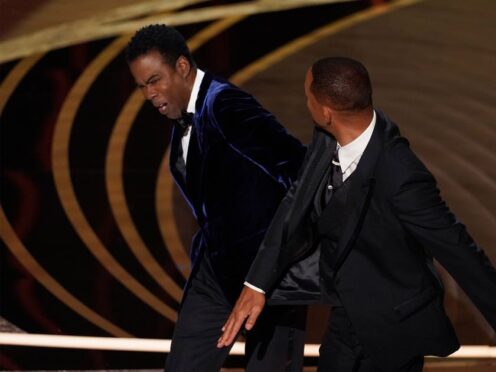Oscars show-runner Will Packer has said Chris Rock did not want Will Smith to be “physically removed” from the ceremony after he stormed the stage to slap the comedian.
The US film producer told Good Morning America that Rock had not wanted to “make a bad situation worse” and that he had spoken to a representative of the Academy on behalf of the stand-up.
It comes after the Academy, which organises the Oscars, said that Smith had been asked to leave the ceremony after the star-studded event but had refused.
EXCLUSIVE: #Oscars producer Will Packer tells Good Morning America about the frenetic aftermath of actor Will Smith slapping host Chris Rock live on stage on Hollywood’s biggest night. https://t.co/AeoYcGkM32 pic.twitter.com/8z35t8TPFw
— Good Morning America (@GMA) April 1, 2022
Appearing on the US show, Packer said: “Shayla (Cowan, co-producer) told me that they were about to physically remove Will Smith and I had not been a part of those conversations.
“So I immediately went to the Academy leadership that was on site and I said, ‘Chris Rock doesn’t want that’.
“I said, ‘Rock has made it clear that he does not want to make a bad situation worse’. That was Chris’ energy. His tone was not retaliatory. His tone was not angry.
“So, I was advocating what Rock wanted at that time, which was not to physically remove Will Smith at that time. Because, as it had now been explained to me, that was the only option at that point.
“It has been explained to me that there was a conversation that I was not a part of, to ask him to voluntarily leave.”
Hollywood trade outlet Variety has reported that Smith met leaders of the Academy on Tuesday to discuss his outburst, and apologised to chief executive Dawn Hudson and president David Rubin.

Smith, 53, won best actor for King Richard, but stormed on stage before his win after reacting to a joke made by Rock which referred to his wife Jada Pinkett Smith’s shaved head.
Packer told GMA that Smith had contacted him the morning after the ceremony to apologise.
“He said, ‘This should have been a gigantic moment for you’ and he expressed his embarrassment and that was the extent of it.”
Packer, who said Rock did not “tell one of the planned jokes” while on stage, also said he initially thought the incident was something Rock and Smith had planned together.
He said: “I thought this was part of something that Chris and Will were doing on their own, I thought it was a bit… like everybody else, I knew we hadn’t practised it.
“I wasn’t concerned at all (as Smith was walking on the stage). I figured OK, he’s going to say something or come at him, something funny is going to happen because that’s the nature of Chris and that’s the nature of Will, so let’s see what happens.
“Once I saw Will yelling at the stage with such vitriol my heart dropped and I just remember thinking ‘Oh no, not like this’.”
A formal review will discuss what disciplinary measures will be taken, and Smith will reportedly be given the chance to provide a written defence before the Academy board meets again on April 18.
The Los Angeles police department said that no charges had been filed against him, but according to Packer they had told Rock that he had the power to do so.
Smith has since issued a formal apology to Rock on Instagram, admitting he had reacted “emotionally” to the joke, but said “violence in all its forms is poisonous and destructive”.
Pinkett Smith also called for a “season of healing”.
